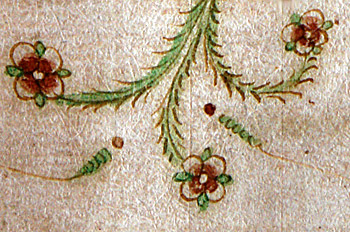King Horn
General Information
Plot Summary

King Murry of Sudene is killed by Saracens, who take over his lands and suppress Christianity. His wife Godhild escapes to live as an anchoress, but their son, Horn, is captured. Unwilling to kill the beautiful youth but fearing his vengeance, the Saracens cast Horn and twelve companions adrift in a rudderless boat. They row to Westernesse, where King Ailmar welcomes them into his court and his daughter Rimenhild falls madly in love with Horn. When the youth rejects her proposal, she and the King’s steward, Athelbrus, arrange for Horn and his companions to be knighted. She gives him a magic ring and, determined to prove his prowess before their marriage, he defeats a ship full of Saracens.
The next day, Horn finds Rimenhild weeping over a dream in which she has captured and lost a fish: he comforts her, but predicts unhappiness. Fickenhild, one of Horn’s companions, maliciously tells Almair that Horn has seduced his daughter and is planning to kill him. The King banishes Horn, who entrusts Rimenhild to his favourite companion Athulf, and asks her to wait seven years before taking another husband. He then sails to Ireland, where he serves in King Thurston’s court under a false name. When a Saracen giant challenges Thurston, Horn undertakes the fight and slays his enemy, who reveals that he also killed King Murry. Thurston’s men defeat the other Saracens, and when his two sons die in battle he offers Horn his kingdom and his daughter Reynild. The knight gives an ambiguous answer but promises to remain for seven years.
He does not contact Rimenhild, whose father has promised her to King Mody of Reynes. She sends out a messenger, who gives Horn the news but drowns before he can return to his mistress. Horn explains his situation to Thurston and sails to Westernesse with an Irish army, arriving on Rimenhild’s wedding day. He exchanges clothes with a pilgrim and attends the feast, where he makes puns about Rimenhild’s drinking horn, references her dream, and drops his ring into her drink. Finally, after testing her loyalty by claiming that her lover is dead, Horn reveals his identity and his army slay the wedding guests. He marries Rimenhild, but vows not to sleep with her until he is king of Sudene. He departs with Athulf and the Irish army and, with the help of a Christian knight, they regain his patrimony, reinstate Christianity and rescue his mother.
Meanwhile Fickenhild builds himself a stronghold and begins to woo Rimenhild. When Horn dreams that his companion is about to drown his wife, he returns, and arrives as they are about to be married. He attends the wedding disguised as a harper and when Rimenhild weeps he slays Fickenhild and his men. Horn makes Athulf’s cousin king of Westernesse and gives Athelbrus Mody’s kingdom. He marries Athulf to Reynild and makes him king of Ireland, before returning to Sudene to rule with his queen.
From: Donald B. Sands, Middle English Verse Romances. Exeter, University of Exeter Press, 1986.
Manuscript: Cambridge, University Library Ms Gg.4.27.2.
Manuscripts
Click a title below to search for all romances in that manuscript.